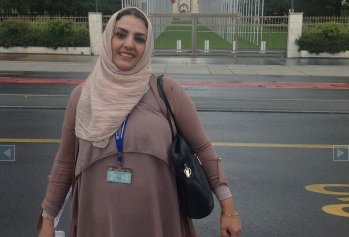Send negotiators, not police forces to deal with Algerian contract teachers
The struggle to improve the status of teachers in Algeria was raised when Education International met with representatives of one of its Algerian affiliates at the recent International Labour Conference in Geneva, Switzerland.

Lalia Djaddour of the Syndicat national autonome des personnels de l'administration publique.
“The Algerian government must end the precarious status of contract teachers and engage in an effective social dialogue, rather than using violence to break up peaceful protests,” said Lalia Djaddour of the Syndicat national autonome des personnels de l'administration publique (SNAPAP).
On 31 May, she addressed the International Labour ConferenceCommittee on Application of Standards, during the discussion on the report of the Joint International Labour Organisation (ILO)–UNESCO Committee of Experts on the Application of the Recommendations concerning Teaching Personnel (CEART).
Protest violently broken up by police
Contract teachers have formed a coordinating committee, of which the SNAPAP is a member. This committee decided to undertake a 215km march from Béjaїa to the capital city of Algiers, in which over 1,000 contract teachers took part.
The march started peacefully on 27 March. However, the police blocked it in the town of Boudouaou as it was getting close to Algiers. Teachers then decided to carry out a protest and staged a sit-in and hunger strike. After 15 days, police forces violently broke up the sit-in, forced people onto buses to take them to remote parts of the country where they left them to fend for themselves.
“We believe our cause is just because, without good working conditions in the public sector, the quality of our children’s education will not improve,” Djaddour stressed. “That is why we are here at the ILO to support the future of our children’s education and we thank Education International for all it has done to protect the rights of workers and quality public education.”
Unfavourable conditions
There are 90,000 permanent teachers in public primary and secondary education in Algeria, with employment guarantees, the right to paid holidays, health insurance and paid maternity leave for women. However, in 2016, 30,000 contract teachers, representing one-third of the teaching staff in the public sector, still have fixed-term contracts and no benefits. Therefore, women contract teachers have no right to maternity leave, and many return to work only a few days after giving birth because of financial needs, Djaddour explained.
The right to a permanent teaching post has been a long-standing demand of the Algerian trade unions, she said. In 2012, in the wake of the Arab Spring, the government regularised many contract teachers to give them permanent positions, but she added, the numbers on contracts have unfortunately risen again.
Under-resourced public education
Deploring the fact that the Algeria’s education sector is very poorly financed, Djaddour noted that this is “a rich country and yet conditions in schools are sometimes really very poor”. In remote areas, Djaddour said, there is no heating during winter, school transport facilities are lacking, and children must walk long distances. She also outlined how there can be over 50 students in a primary school class, and teachers have a very heavy administrative burden without enough time to prepare lessons.
School inspectors, she said, are “more like police”, not interested in the quality of public education but seeing their role as checking up on teachers and ensuring they do not create difficulties for the government.
Source: Education International
- 396 reads
Human Rights
Ringing FOWPAL’s Peace Bell for the World:Nobel Peace Prize Laureates’ Visions and Actions

Protecting the World’s Cultural Diversity for a Sustainable Future

The Peace Bell Resonates at the 27th Eurasian Economic Summit

Declaration of World Day of the Power of Hope Endorsed by People in 158 Nations

Puppet Show I International Friendship Day 2020

